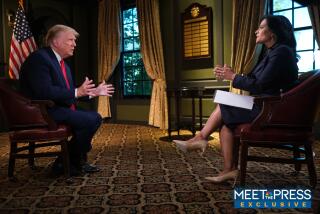CAMPAIGN â96 : Media Chorus Sings Dirge for Dole
NEW YORK â Pity the Republican presidential front-runner, Sen. Bob Dole. The other candidates have long been after him, and now the media seem to be too.
Being ahead is like wearing a bullâs eye: Any misstep and the arrows are instantly launched in your direction. These past several days, the arrows from the press pack have been increasingly sharp. âFoundering,â âfaltering,â âslipping,â âsaggingâ--the adjectives of the week suggest that Dole is too dour, that his support is weak and that his campaign could be ailing, if not at deathâs door.
What has happened to Dole is a classic example of journalists moving in packs. The basic story line--that Dole is in trouble--has swept through the press corps, forcing Dole to spend much of his time simply responding to questions about his future. Simultaneously, his rival Steve Forbes has ridden to new media heights in part because he is a novelty, paying his own way into the contest with millions of dollars in political advertising.
Some press analysts argue there is nothing wrong with what has happened to Dole. As Michael Gartner, publisher of the Tribune in Ames, Iowa, and a columnist for USA Today, puts it: âI think the story that Dole is in trouble is true. Thereâs nothing wrong with pack journalism if itâs right.â
Not surprisingly, Dole disagrees. âI donât know, maybe [Forbes] owns stock in all those networks and Time and Newsweek,â Dole complained to reporters in Iowa. âSomehow, they donât seem to bother him.â
But while Gartner may be correct about the substance of the coverage, the tone of stories about Dole in recent days has often bordered on ghoulish. Dole âlooked like a funeral director, not a front-runner,â said Newsweek about Doleâs response to President Clintonâs State of the Union address. Time described the Kansas senator as the âNational Mortician, brusque, impenetrable, embalmed by Washington . . . â And to round out the grim reaper motif, a San Francisco Examiner editorial called the speech Doleâs âaudition as host for âTales From the Crypt.â â
At least some of Doleâs problems with the press were probably inevitable, say those who have studied press coverage of campaigns. âThereâs an element of the mediaâs lying in wait for a story in a time when there havenât been very many,â says Jarol Manheim, professor of political communication at George Washington University in Washington.
At the same time, however, âit is also a real story here of missed opportunity. For all of Doleâs complaints of media commentary, he did not do a credible job at a time of great opportunity. To complain that the press is hyping this story is fair, but to complain that they created the story is unfair.â
James Fallows, author of a new book that sharply criticizes the mediaâs coverage of politics, makes a similar point. Doleâs problems, Fallows says, stem in part from his own campaign theme, which is light on ideas and argues âbasically, âElect me rather than him.â â
âHis campaign may be a lesson to political people about the vulnerability of having a campaign with no real issue attached to it,â Fallows said. âIf in that situation you seem to be weak in simple animal terms, thereâs nothing to fall back on.â
The problem for Dole, of course, is that once the press pack latches on to a particular story, there is little a candidate can do to change it. Right now, Doleâs argument with the press runs the risk of overshadowing whatever other message he is trying to convey.
On the campaign trail in Iowa on Monday, Dole accused reporters of hammering him as front-runner and not scrutinizing Forbes, who has been moving into a competitive position with him in the early primary and caucus states.
Forbes has the comparative luxury of having the media scrutinize his proposals. Even when the coverage is critical, as many accounts of his proposed âflat taxâ have been, the attention given to his policies conveys the message that he is a candidate with new ideas.
The fact that Forbes is a businessman rather than a politician with a voting record has also made reporting about him more difficult. âThere is a lot of uncertainty in the coverage of Forbes,â Manheim said. âThe press is just not sure what to make of him.â
More to Read
Get the L.A. Times Politics newsletter
Deeply reported insights into legislation, politics and policy from Sacramento, Washington and beyond. In your inbox three times per week.
You may occasionally receive promotional content from the Los Angeles Times.










